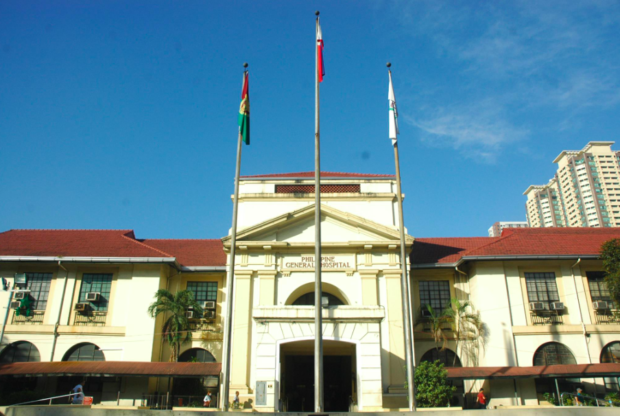PGH can breathe easier now as COVID admissions drop
Almost throughout 2020, Inna Agoncillo was assigned to the central intensive care unit of the Philippine General Hospital (PGH), which became the country’s main referral hospital for COVID-19 cases, if not the barometer of the pandemic situation. The 27-year-old nurse saw her designated area converted into a ward for coronavirus patients and found herself working up to 11 hours a day, at times with no rest days in a given week, while enduring the discomfort of her PPE (personal protecting equipment).
While Agoncillo counted herself fortunate that she has not been infected, it put a strain on her team when other nurses caught the virus, forcing her and the remaining staff members to go on 16-hour shifts.
That was worst she could remember of that period. But two years and four case surges later, health workers at PGH “are all doing a little bit better and we are now more at ease,” she said.
Weekly report
According to PGH spokesperson Dr. Jonas del Rosario, the hospital would cease its daily COVID-19 updates and issue a weekly report instead.
“We are still recording and tracking our patients, but we just post it now weekly …. [The] PGH is now taking care of more non-COVID cases,” he said in an interview.
Article continues after this advertisementAll COVID-19 patients are now placed in the 42-bed isolation area “Bayanihan,” which was opened in August last year to augment the regular bed capacity. The hospital currently has 30 active cases, including 18 new patients admitted from April 1 to April 7.
Article continues after this advertisementIt was a significant drop from the time when the PGH saw more than 300 admissions in January 2022, amid the wave of infections from the Omicron variant, the last reported surge so far.COVID-19 admissions eventually went down to 308 on Jan. 30, 185 on Feb. 28, and 99 on March 2.
When asked if the hospital is ready for another surge of cases, Del Rosario said “We have contingency measures. Our manpower is fixed and we will redistribute and divide based on need.”
On Thursday, the hospital infection control unit released its first weekly coronavirus report, which showed that only 1 out of 25 tested PGH staff members was found positive.
New surge possible
According to Dr. Jaime Aherrera, an epidemiologist and interventional cardiologist at PGH, the hospital still has “a handful” of COVID-19 patients with cardiovascular comorbidities, but they are “much less than the number we used to take care of.”
In an email interview, Aherrera said it was the “sincere hope [among health workers] that the current status we’re in is a good sign—that we are inching more toward the light at the end of this long and challenging tunnel we’re in.”But Dr. Teodoro Herbosa, adviser to the National Task Force Against COVID-19, warned that a new surge was still possible.
“We have the campaign period, elections and we also have religious events like Ramadan and mass gatherings. All of these are what we call ‘high-risk events’ for superspreaders,” he said at Saturday’s Laging Handa briefing. He noted that Muslims would usually eat together at night during Ramadan, while many travel to the provinces during Holy Week.
“This is a good reminder for us that COVID-19 cases could rise in the next two months,” Herbosa said. OCTA Research fellow Dr. Guido David agreed that there could be a surge after the elections. “It is actually possible that there might be an increase in the number of cases because now we are starting to have waning immunity [after the] surge in January,” he said.
David noted that “it has been three months, [and] it is possible that we have people whose antibody levels have decreased.”
The next surge could happen this month or after the May 9 general elections at the latest, he said.
“In fact, we see upticks in other parts of the country, but these upticks are still small, not alarming yet. In Central Luzon we saw an uptick, in Northern Mindanao we saw an uptick,” David said.
But the country still remained at low-risk classification for COVID-19 for now, he said. For Herbosa, there is an urgent need for more Filipinos to get their booster shots.
He said the Philippine Genome Center has not yet detected the XE recombinant, despite cases of that variant being reported in neighboring countries like Thailand.
“So the booster is very important [because] our antibodies go down and wane, [and] if we wait for the new variant to enter here, it might be too late,” Herbosa added.
David backed calls for a second booster shot for Filipinos, citing data that it could help increase protection against the virus.
RELATED STORIES
Plan to build new PGH complex in QC gains traction
PGH healthcare workers slam DOH risk pay rule
For more news about the novel coronavirus click here.
What you need to know about Coronavirus.
For more information on COVID-19, call the DOH Hotline: (02) 86517800 local 1149/1150.
The Inquirer Foundation supports our healthcare frontliners and is still accepting cash donations to be deposited at Banco de Oro (BDO) current account #007960018860 or donate through PayMaya using this link.
